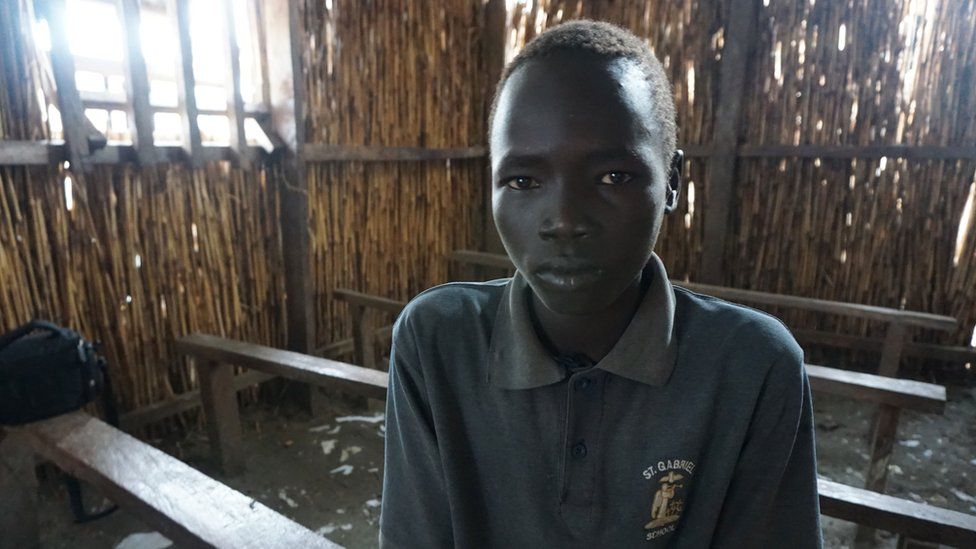South Sudan boy who spent days hiding in a swamp
- Published

Eleven-year-old Kai Tap sits alone looking pensive as he watches other children sing and play at Eden school inside a civilian protection site run by the United Nations in South Sudan.
He recently arrived at the camp in the northern town of Bentiu having walked 129km (80 miles) alone for four days and nights from Leer, a small town in Unity State, scene of the most recent fighting in the country.
He says that fighting between rival forces prompted him to leave his family and flee to the camp. The fear had become too much for him.
"At night they would come and start shooting at us and we would disperse," says Kai.
"We used to run into the swamp and hide there with only our heads above the water."
He cannot remember how many days he spent hiding in the swamps.
The family cattle had been stolen, his brother who looked after the herd with him, killed, and his home destroyed.
South Sudan is the world's youngest country and much of the region's recent history has been characterised by violence.
Having sought refuge, he worries about the family he left behind.
"I don't know if they are safe, if they are alive or dead because there is ongoing fighting. And now I'm torn between two things - to go to school or to return home to bring my parents."
Inflation at 700%
Former Botswana President Festus Mogae, who chairs a commission that monitors the 2015 peace agreement, says the ongoing hostility might trigger an "uncontrolled escalation of violence".
Fighting has been reported around Yei in the south-east, Leer in the north, and Nasir in the north-east.
As a consequence of the deteriorating security situation, transporting goods by road is severely hampered.
And commodity prices have risen as inflation hit 700%.
Humanitarian organisations have been forced to rely heavily on air transport, a much more expensive alternative.
Planes carrying grain, pulses and vegetable oil fly daily from the capital, Juba, or Gambella in Ethiopia and drop hundreds of tonnes of food stuff on drop zones near camps where people have fled.
Even fuel for vehicles and generators is transported by air.
'Malnutrition up threefold'
The UN children's agency Unicef says the escalating crisis means that they have to increase supplies, staff and security officers.
"Malnutrition in Northern Bahr al-Ghazal has gone up threefold and so we have to have three times the amount of supplies to respond to the children's needs," says Mahimbo Mdoe, Unicef's representative in South Sudan.
The situation, he says, is "dire" with up to six million children affected.
He warns that unless things change, the situation could get worse for civilians, especially women and children, and it would also be harder for humanitarian workers to reach them.
In August, the UN Security Council passed a resolution creating a regional Regional Protection Force (RPF) whose mandate would include securing Juba as a neutral ground in the power struggle between President Salva Kiir and his sacked Vice-President Riek Machar.
South Sudan's government has agreed to the deployment but with conditions.
President Salva Kiir's spokesman Ateny Wek Ateny said that the government would determine "where the troops come from and where the protection force would be based".
If, and when an agreement is reached, it will take several more months before the force arrives in South Sudan.
The Joint Monitoring Monitoring and Evaluation Commission (JMEC) estimates that it would take at least three months for contributing countries to prepare and deploy the troops.
The commission also says that the peace agreement signed in August 2015 is still on course, even though Mr Machar remains out of the country and government, whereas he was named vice-president under the deal.
Find out more about South Sudan:
Deputy chairperson Lt Gen Augostino Njoroge said the JMEC has been advised by the regional heads of state to continue working with the government of South Sudan, including newly appointed Vice-President Taban Deng as the representative of Mr Machar's side.
"Whatever differences there are within their side, they will be able to solve them and we should not stop implementing the agreement because it has much more," said Gen Njoroge.
Mr Machar fled South Sudan for a second time in July, days after fierce fighting broke out between forces loyal to him and those loyal to President Kiir.
He is currently in South Africa, and it remains unclear if or when he will be allowed to return to South Sudan.
But with no quick solutions in sight, the lives of millions of South Sudanese remain in limbo, and for the hundreds of thousands trapped in camps, all they can do is wait for a lasting agreement.
As for Kai, he now has a chance to go to school, but his message to the leaders of this troubled new nation is that they should stop the fighting.